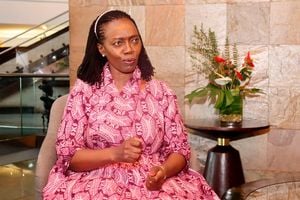Sabaot leaders join national movement to end FGM, protect girls' education

Sabaot Supreme Council of Elders during a press briefing in Kapsokwony town. The elders have denounced female genital mutilation as a cultural practice.
What you need to know:
- The Supreme Council of Sabaot Elders has made a historic declaration denouncing FGM and child marriage, becoming the fourth community in Kenya to officially abandon the practice.
- The declaration follows the rescue of more than 200 girls from FGM during the Covid-19 pandemic in Mt Elgon, where some victims were as young as seven years old.
- This commitment marks a significant cultural shift, with Kenya's national FGM prevalence having dropped from 38 percent in 1998 to 15 percent in 2022.
More than 200 million girls and women alive today have been subjected to female genital mutilation (FGM), with another 68 million at risk by 2030. But in Kenya, a quiet revolution is brewing as traditional elders stand up against this harmful practice, one community at a time.
This week, the Supreme Council of Sabaot Elders made a historic declaration denouncing FGM and child marriage, marking a significant turning point in the fight against gender-based violence. The leaders of six sub-clans – Someek, Agiek, Bong'omek, Bok, Koony, and Sabiny – signed a commitment to end all harmful cultural practices that target and endanger women and girls.
"To eradicate FGM, people must abandon the practice," declared Prime Cabinet Secretary Musalia Mudavadi at the signing ceremony. "The strong voices of survivors, community leaders, fathers, brothers, and grandmothers will be the driving force behind total abandonment of FGM and child marriage."
The timing of this declaration is particularly poignant. During the height of the Covid-19 pandemic, when schools were shuttered to contain the virus, more than 200 girls had to be rescued from forced cutting in Mount Elgon. Some were as young as seven years old, being prepared for the ritual as a supposed sign of bravery and maturity.
According to many cultures that permit FGM, marriage typically follows once a girl is cut. The practice has been especially prevalent in the Mount Elgon region, predominantly inhabited by the Sabaot community. However, the elders' declaration signals a transformative shift in cultural attitudes.
Through the declaration, the elders committed to embracing alternative rites of passage that emphasise dignity, respect, and honour. They acknowledged that FGM not only causes physical, emotional, and psychological pain but also leads to early marriage, teenage pregnancies, and school dropouts. Importantly, they pledged to support girls' education to achieve equality with their male counterparts.
Gender Principal Secretary Ann Wang'ombe, who witnessed the declaration, termed it momentous. "Ending FGM is both a legal and social imperative that cannot wait any longer," she emphasised.
The Sabaot Declaration becomes the fourth such pronouncement by community elders in Kenya, following the Alale Declaration by Pokot Elders and the Loita and Kisima declarations by Maasai and Samburu elders respectively. The impact of these declarations has been profound. For instance, after the historic Kisima declaration, witnessed by former President Uhuru Kenyatta, Samburu elders lifted a cultural curse on uncircumcised girls – a curse that had previously driven many to undergo the cut for social acceptance.
Tony Mwebia of Men End FGM Foundation, an organisation leading campaigns to encourage male involvement in the fight against FGM, sees the Sabaot elders' declaration as a significant milestone. "The event serves the purpose of popular mobilisation and should be publicised through local media engagements and barazas. This will allow organised diffusion to take place within the community and ensure everyone is aware of the bold step taken by the elders."
The declaration was achieved through the Kenya-Finland programme, a three-year initiative being implemented in Bungoma, Samburu, and Kilifi counties. The programme aims to end gender-based violence and strengthen response services while supporting safety audits, community consultations, and rights-based analysis to address gender equality.
Mudavadi has now appealed to other communities – including the Gabra, Rendile, Kipsigis, Marakwet, Keiyos, and Kuria – that have yet to denounce FGM to follow suit.
"FGM is detrimental to the physical, social, and emotional well-being of women and girls. It is a human rights violation that has a ripple effect on the country's social, economic, and political development," he stated.
The impact of such community-led initiatives is already evident in national statistics. According to the Kenya Demographic and Health Survey, the national prevalence of FGM among women and girls aged 15–49 has steadily declined from 38 percent in 1998 to 15 percent in 2022. However, experts warn that population growth in many settings means the absolute numbers of girls at risk could still grow if the practice continues at current levels.





